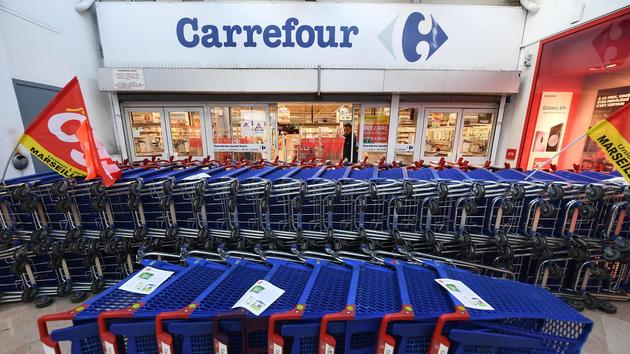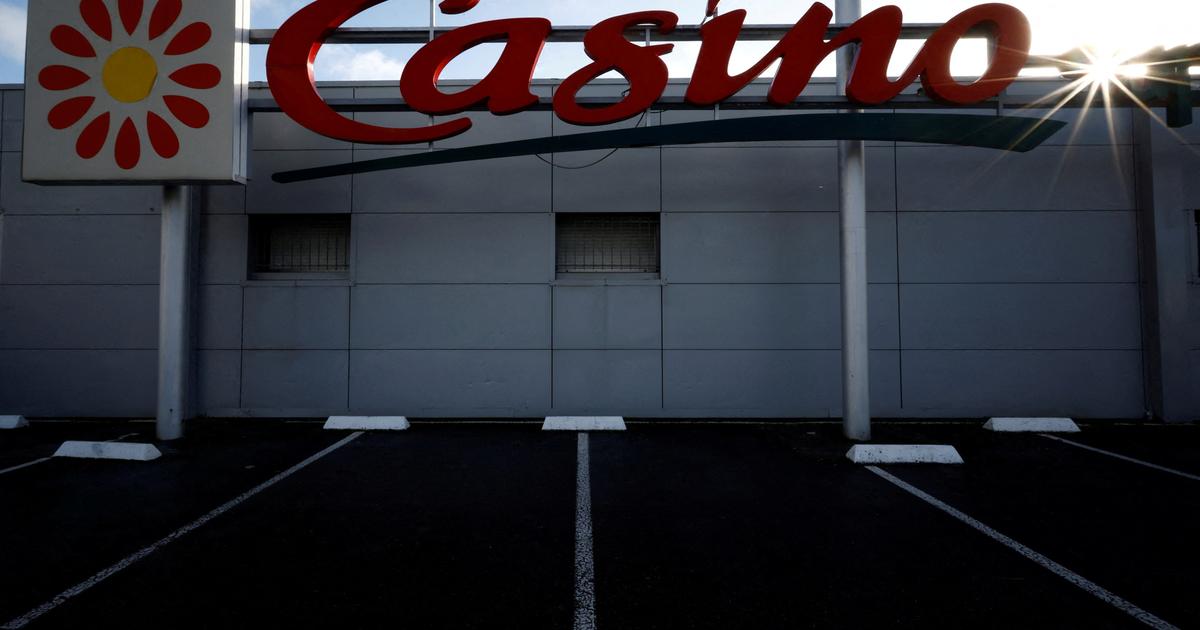Laurent Izard is a normalien and associate of the University in economics and management. A law graduate from the University of Paris 1 Panthéon-Sorbonne, professor of the higher chair, he is the author of numerous higher education textbooks in economics and management. He is the author of
La France vendue à la cut-out
(L'Artilleur, January 2019).
In March he will publish the work
À la sueur de ton front
(Éditions de l'Artilleur), which analyzes the consequences of globalization on employment and suffering at work.
FIGAROVOX.
- The French distribution giant Carrefour
has been approached by the Canadian food group Couche-Tard for a "
rapprochement
The two companies said last Tuesday in separate press releases
.
What is it more precisely?
Laurent IZARD.
-
For the moment, we do not know the exact terms of the offer proposed by the Canadian group, which refers to a "
non-binding letter of intent with a view to a friendly rapprochement
".
In reality, everything suggests that this is purely and simply a takeover bid, not necessarily a friendly one.
This, on the basis of a starting price of 20 euros per share, would value the Carrefour group at around 16 billion euros excluding debt.
Read also:
The State opposes a takeover of Carrefour by the Canadian Couche-Tard
This large-scale project involves obvious power and sovereignty issues.
It should be noted first of all that this offer takes place in a particular geopolitical and economic context: the painful ratification of CETA first of all, a free trade agreement with Canada, contested for both ecological and economic reasons and even public health.
The economic uncertainty that weighs on mass distribution then: the rise of the giants of e-commerce and the health crisis have destabilized many groups and Carrefour is also financially weakened by the consequences of an expansion strategy. adventurous international organization that forced the new management team to withdraw from several countries including China in 2019.
We can't help but see Couche-Tard's offer as an opportunistic strategy
Under the chairmanship of Alexandre Bompard, the Carrefour group succeeded in reducing its indebtedness but its stock market valuation remains low and one of its main shareholders, the Arnault Group, clearly announced in September 2020, its intention to sell the majority of Carrefour shares it holds, thus paving the way for the arrival of new investors.
In this context, we cannot help seeing Couche-Tard's offer as an opportunistic strategy, hence a first cautious reaction from Carrefour management who specifies in an internal memo that they will “
examine the project”. submitted to it by Alimentation Couche-Tard
”, in order to“
determine whether a project can be designed in the interest
”of the group…
"
Carrefour is an essential link in the sovereignty and food security of the French, which is at stake in this operation
" underlined Bruno Le Maire on France 5. The Minister of the Economy is "
a priori not favorable to the idea that crossroads be bought by a foreign group.
»Should we expect Carrefour to remain French or is it simply a communication operation?
The Minister of the Economy and Finance actually reacted immediately after the announcement of Couche-Tard's offer and adopted a particularly offensive tone: he personally opposes this merger, citing the risks that this operation represents for the food security and sovereignty of the French.
An attitude that contrasts with the enthusiasm of this same minister with regard to the CETA treaty and questions the coherence of the government's policy ...
On the other hand, Bruno Le Maire affirms that Bercy has the legal tools to block this project within the framework of the foreign investment control mechanisms targeting our strategic companies.
This is quite correct: since a decree of December 31, 2019, the list of sectors subject to the prior authorization procedure includes "
food safety
", a term which is admittedly imprecise, but which cannot exclude the question of logistics. and distribution.
To read also:
“Big Business” N ° 38: Can Carrefour be sold?
It is however difficult to know if the spontaneous declaration of Bruno le Maire really reflects his thoughts or if it is a simple posture intended to position himself favorably for future negotiations on the terms of the merger.
Because the stakes are multiple: Carrefour has more than 1,200 stores and 320,000 employees around the world, including 100,000 in France.
In the past, most mergers have resulted in significant downsizing.
This is also one of their purposes: mergers do not only aim to achieve objectives of industrial or commercial dimension or complementarity: it is also a question, within the framework of a strategic approach, of rationalizing activity, which results in particular in the closure or repositioning of unprofitable sites and an inevitable hunt for "
duplicates
" even if, in this case, the absence of territorial overlap limits the risks.
We can therefore understand the concern of Élisabeth Borne, the Minister of Labor, who also immediately expressed her opposition to this project by mentioning the risks of a change in Carrefour shareholding, especially for youth employment. ...
Our country (...) risks very soon not being, for the first time in its history, in a situation of food self-sufficiency
On the other hand, we can legitimately wonder about Couche-Tard's financial capacity to support the development of the Carrefour group, taking into account the interests of the various stakeholders.
As for the issue of food sovereignty, it remains at the heart of the debate: our country, often described as the “
breadbasket of Europe
”, risks very soon not being, for the first time in its history, in a situation of self-sufficiency. food, specialists claiming that from 2023, our food imports will exceed our exports.
Finally, should we remember that our political independence is based on our economic independence?
The more the centers of economic decisions move away from our country, the more the room for maneuver of our leaders is reduced.
Carrefour is the country's leading private employer.
If even a big fish like Carrefour is likely to be redeemed, what does that mean for our other flagships?
Are we able to curb this movement?
It should first be remembered that in a few decades, we lost control of our main industrial flagships: Péchiney, Arcelor, Rhône-Poulenc, Alstom Power, Lafarge, Alcatel, Technip ... and that these operations have sometimes led to dismantling or outright disappearance of the acquired group.
The appetite of international investors is limitless and concerns all sectors of our economy.
The capital of CAC 40 companies is also 50% controlled by foreign investors.
And they are also interested in our mid-cap companies and SMEs / SMIs, particularly when it comes to appropriating our innovations in the field of high technology which explains, among other things, the acquisitions of Altis (semi -conductors), Aldebaran Robotics (educational robots), Savoye (software solutions, design of automated systems), Latécoère (pioneer of Lifi technology), Souriau (specialist in interconnection for defense), HGH (expert in civil and military infrared technologies), Tronics (microelectromechanical systems used in aeronautics, defense or medicine), SCPS (specialist in electric batteries) or Linxens (world leader in the manufacture of flexible etched circuits and specialist in contactless payments), absorbed by Chinese state-owned company Tsinghua Unigroup with the approval of Bercy ...
To read also:
Carrefour was asked by the Canadian Couche-Tard for a "rapprochement"
To curb this movement, we first need political will.
Because at the microeconomic level, each absorption operation can be justified, by a common growth strategy, a sector logic or even the preservation of employment or even the rescue of a threatened company.
However, until now, this process has taken place in a global context of free movement of capital, with an assumed political will to integrate France more into the globalization process, which in principle prohibits us from controlling the taking of capital. foreign participation or mergers and acquisitions.
To slow down the loss of control over our economic assets, we need to find new sources of funding for our businesses
On the contrary, we go to great lengths to attract foreign investors without distinguishing between those who really contribute to the growth of our country and those who adopt predatory behaviors.
This is why the legal mechanism for controlling international investments in France has so far proved ineffective: it has not resulted in the blocking of the appropriation of our companies, even strategic ones, by foreign investors, and has more used to impose on the buyers commitments that they have, in practice, only rarely respected.
But the real problem is not there: to slow down the loss of control of our economic heritage, we have to find new sources of financing for our companies and offer guarantees to overcome the reluctance of French investors.
Otherwise, it will be difficult to resist the pressure from international investors.
During his presidential speeches during the various confinements, the President of the Republic suddenly began to insist on the notion of “
sovereignty
”, a theme that has since been taken up by his Minister of the Economy.
Do you think we are witnessing a change of era on this issue or just a passing fad?
It seems to me that the French are more and more sensitive to the question of our economic and political sovereignty.
It is true that the health crisis, which was quite predictable, revealed our inability to have essential basic equipment such as respirators, gowns, gloves, hydro-alcoholic gel or even masks, not to mention vaccines. .
This crisis has shed light on our economic downgrading and is generating awareness of our dependence on potentially hostile foreign powers.
In such a context, we can see that it is particularly hazardous to depend on foreign imports: the logistical constraints are strong, the economic rules of the game upset, and the logic of every man for himself can take precedence over commercial or diplomatic interests.
The precautionary principle therefore implies being able to manufacture in France products that are vital for our economy and in particular those necessary to fight against epidemic risks.
It is even our duty to be able to help countries whose economy does not allow such investments.
To read also:
Laurent Izard: "In a context of crisis, it is risky to depend on foreign imports"
But more generally, it is about drawing the consequences of the fragility of global value chains and our dependence on China and the USA.
The President of the Republic and the members of the Government, while subscribing to a liberal globalist logic, increasingly evoke the imperative of economic sovereignty and have sent certain strong signals in this direction: we can for example cite the strengthening of our legal arsenal on the control of foreign investments in France, the new ambitions of Bpifrance, the provisional nationalization of the Chantiers de l'Atlantique, or the blocking, after many twists and turns, of the takeover of Photonis, our specialist in night vision systems , by the American Teledyne.
Is this a political shift?
It would take more strategic coherence and courageous decisions of this kind to be truly convinced of this.








